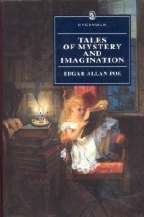Tales of Mystery and Imagination
Edgar Allan Poe
Everyman / Random House
US Mass market Paperback
ISBN 0-460-87342-3
Publication Date: 08-01-1993
Pages: 591; Price: $7.95
Date Reviewed: 22-06-04
Reviewed by: Katie Dean © 2004

REFERENCES
COLUMNS
|
|
|
Tales of Mystery and ImaginationEdgar Allan PoeEveryman / Random HouseUS Mass market PaperbackISBN 0-460-87342-3Publication Date: 08-01-1993Pages: 591; Price: $7.95Date Reviewed: 22-06-04Reviewed by: Katie Dean © 2004 |
|
|
REFERENCES |
COLUMNS |
Edgar Allan Poe's 'Tales of Mystery and Imagination' is an eclectic mix of short stories; some can be classified as horror, some mystery, some simply as flights of fancy. The one common characteristic they all share is their rich and powerful descriptions. Poe is equally at home when bringing places to life, as when evoking the emotions of his characters. Despite this, he never gives the reader all the answers, but leaves much to our imaginations and provides much to think about after the story has been read.
Poe was a notorious hoaxer and this is often reflected in his short stories, very few, if any of which, are believable. In some cases, like 'The Domain of Arnheim', they appear more as fairy stories, never intended to be taken as true. This particular tale also illustrates Poe's great descriptive powers to good effect. The tale is nothing more than a lengthy description of an imaginary landscape, supposedly created in Arnheim, Holland. The imagery it evokes is so wonderful that the lack of narrative progress does not seem to matter.
This pure description is one of the categories into which Poe's stories can be grouped. However, his more narrative offerings are no less wonderful. 'The Fall of the House of Usher' is something of a ghost story and something of a horror story. Poe's imagery and setting evoke a chilling and supernatural background against which the events take place. Once again his descriptive powers conjure up images of which a Hollywood movie would be proud.
The horror stories are not the only ones that offer something recognizable or topical to the modern reader. One story in particular, leaps out as dealing with some contemporary concerns. 'The Conversation of Eiros and Charmion', despite its title, is actually a description of the destruction of the world by a collision with a comet. Anyone who saw the films 'Deep Impact' or 'Armageddon' will immediately identify with this tale.
Poe also offers tales of buried treasure, a mysterious Doppelganger, time travel and death. This latter topic is a favourite with Poe. Many of his stories involve mysterious deaths, conversations that take place after death, or ghosts. This fascination with death grows out of Poe's interest in extreme states of the human mind. This is the real 'theme' that links all of his stories. Poe's characters are frequently suffering mental illness, extreme fatigue or other physical states that can induce the mind to play tricks on the body. His characters thus become susceptible to fear or even terror induced by imagining the extraordinary - -whether sights, sounds or smells - in the everyday. Poe is acutely aware of the power that the mind is capable of exercising over the body. As soon as the body is placed under some form of stress or becomes weakened, the mind or imagination can wield immense power, enough even to kill a person. This is the idea that fascinates Poe and one to which he returns again and again in various manifestations.
Poe's short stories are both entertaining and strangely haunting. Never opaque, they leave the reader with much to ponder and a strong desire to seek a rational explanation for the seemingly inexplicable. Whether Poe himself had such explanations is doubtful, but these are fascinating pieces of narrative and description. Despite the size of this volume, it is easy to dip in and find an interesting tale to occupy anything from five minutes up to an hour. For anyone who enjoys horror or mysteries, or simply appreciates powerful descriptive works, Poe has plenty to offer.